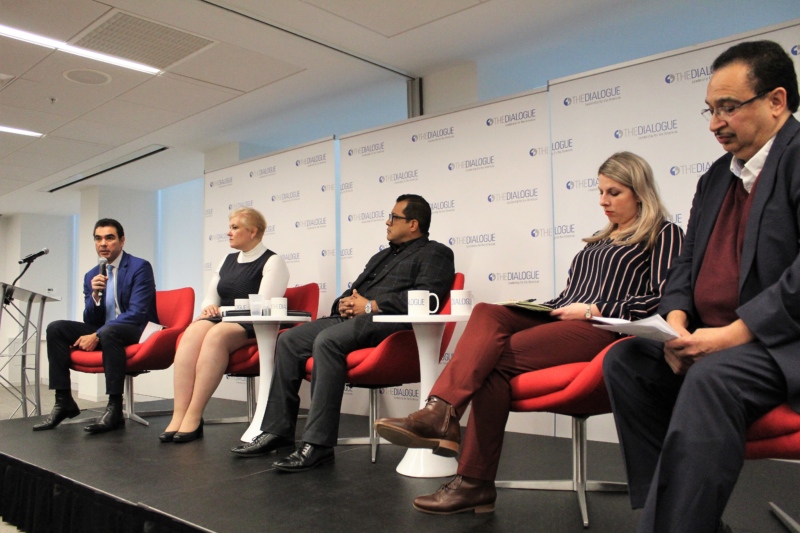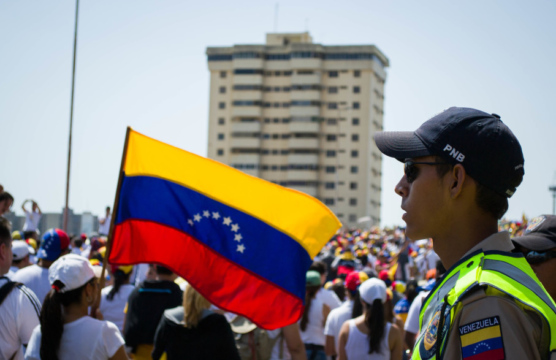A Fatal Blow to Democracy
Nicaragua is on the precipice.
On December 20, 2018, the Inter-American Dialogue and Reporters Without Borders hosted an event titled “Attacks on Press Freedom and Civil Society in Nicaragua.” The event brought together a remarkable panel of experts on freedom of the press, as well as activists and journalists from Nicaragua who have been affected in some way by the regime of Daniel Ortega. The panel was comprised of Margaux Ewen, Executive Director of Reporters without Borders North America; Anibal Toruño, Manager and owner of Radio Dario; Felix Maradiaga, Executive Director of the Institute for Strategic and Public Studies in Nicaragua; and Tanya Mroczek-Amador, Executive Director of Corner of Love in Nicaragua. The moderator of the event was Manuel Orozco, Program Director at the Dialogue. Michael Shifter, President of the Intern-American Dialogue, delivered opening remarks.
Since April 2018, government-backed attacks on Nicaraguan newspapers and civil society groups have sparked growing concern over a worsening wave of repression. Journalists and activists all over the country have been threatened, arrested, beaten, and are under constant surveillance. Highlighting the recent attacks on Confidencial newspaper as an example, panelist Margaux Ewen from Reporters Without Borders noted that this was “the latest in a series of attacks that we’ve seen escalating” since April 2018.
In his remarks, Manuel Orozco emphasized the lack of basic freedoms in Nicaragua, including freedom of the press, freedom of assembly and freedom of expression. Unfortunately, Nicaragua has entered into a situation of “Repression 2.0,” Orozco argued, which is affecting the social, economic and political conditions of the country. Orozco highlighted that “political authority is monopolized by a single entity: Congress, the Supreme Court, and the Elections Commission are completely controlled by one person. The quality of democracy is de facto and de jure compromised,” Orozco concluded.
The Executive Director of Reporters without Borders North America, Margaux Ewen, pointed out that there has been increasing repression of media outlets and that reporters in Nicaragua are risking their lives trying to cover the protests occurring in the country. She noted that Radio Dario, a news radio channel in Nicaragua, was burned to the ground in the state of Leon and some other local media organizations have experienced similar attacks. Ewen expressed concern regarding the fact that reporters all over the country are being arrested, observed by drones, and have received death threats from police officers.
.@ManuelOrozco65 comments, "this is not a capricious request to remove a President, but a call to re-establish democracy. Democratic practice in Nicaragua is suffering from the monopoly of power across all democratic institutions." #PressFreedomNicaragua
— The Inter-American Dialogue (@The_Dialogue) December 20, 2018
In their subsequent comments, panelists Anibal Toruño and Felix Maradiaga agreed on the danger that journalists currently face in Nicaragua. Maradiaga highlighted the importance that the civil society will have in bringing back democracy to Nicaragua. However, he indicated that Nicaragua will have to build robust and democratic institutions to prevent falling back into tyranny.
Finally, Tanya Mroczek-Amador, who directs a civil society organization in Nicaragua, expressed concern about the Ortega regime’s characterization of humanitarian work as somehow threatening. She invited the international community, especially English speakers, to educate themselves about the situation and get involved in helping Nicaragua.
The event concluded with a Q&A session addressing concerns about what the United States can do for Nicaragua, and how international organizations could offer protection to Nicaraguans. Finally, the conversation ended with a call for help to international organizations and human rights defenders.
Nicaragua is on the precipice.
What will Ortega’s landslide victory allow him to do in his next term?
Events in the Ukraine have lifted the morale of anti-government protestors in Venezuela and elevated their expectations.
 Elizabeth Belair / Inter-American Dialogue
Elizabeth Belair / Inter-American Dialogue
